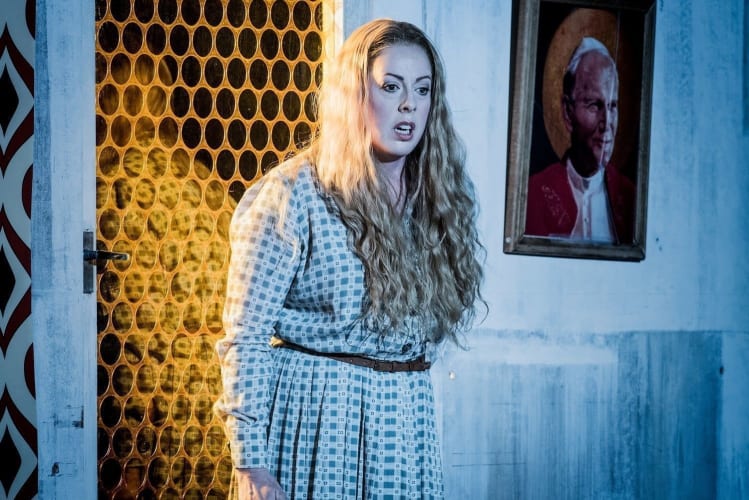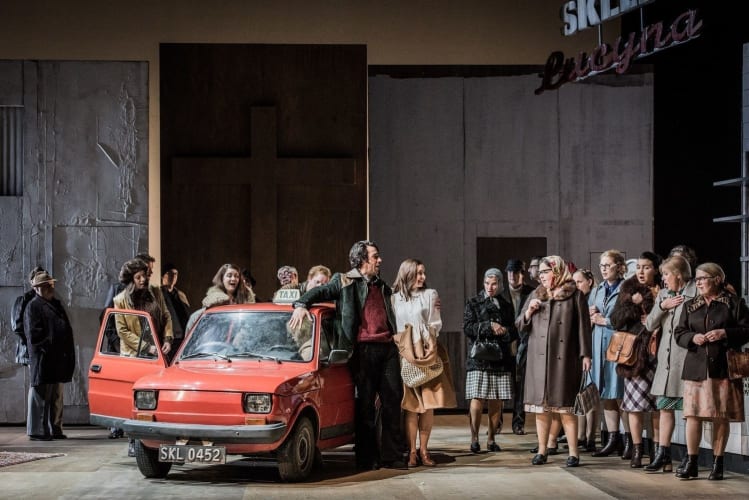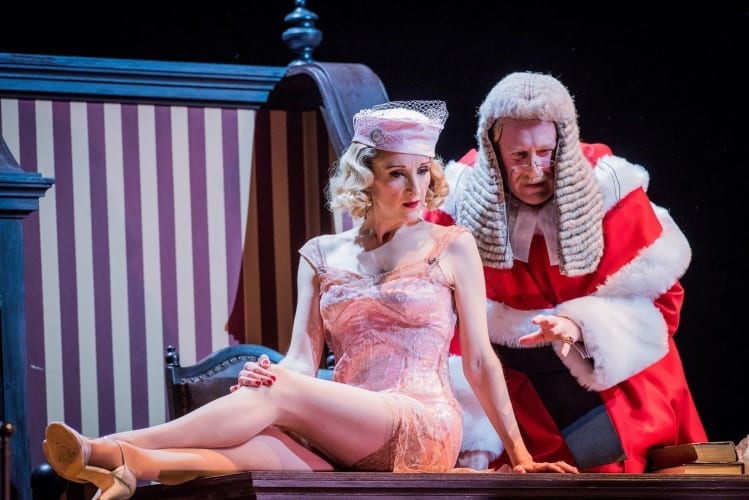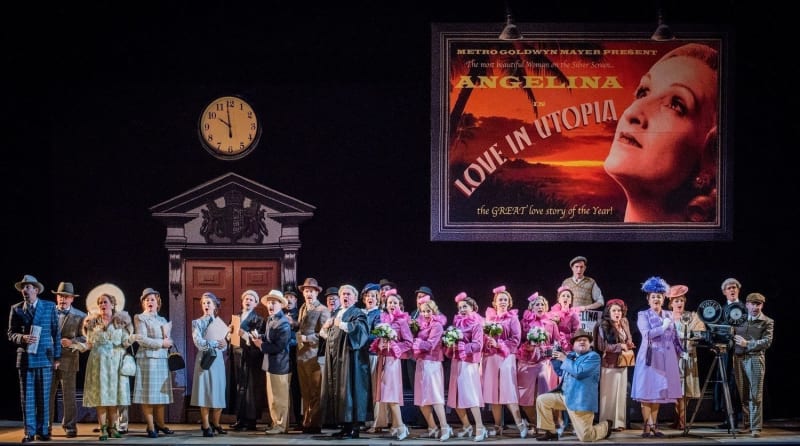Opera North’s season of “Little Greats”—a festival of short operas programmed to showcase the sheer range of music, styles and emotions conveyed through the operatic form—continues with another inspired pairing.
There are evident links between these two one-acters: both are late-nineteenth-century works and both pivot around the disclosure of an infidelity. But you’d be hard pushed to imagine a more contrasting brace of approaches to this common theme, especially in these stagings.
Mascagni’s popular melodrama Cavalleria rusticana is an example of the verismo style, which tells tales of everyday people, albeit with extreme, frequently murderous, turns of events. Karolina Sofulak’s production transposes the setting from downtrodden 1870s Sicily to downtrodden 1970s Poland, giving it a highly symbolic set dominated by a massive wooden crucifix (along with a smaller picture of Pope John Paul II).
The weaving of this iconography through the design and direction is striking, and it generates some awe-inspiring imagery, including a pseudo-crucifixion and a sombre take on the drinking song “Viva, il vino spumeggiante” which emphasises its Mass-like undertones.
As a newcomer to this opera, I found the austerity of the staging, the openness of the set, and the stylised opening tableaux intriguing though at first lacking in clarity; this production thrusts its (impressive) symbolism at you from the outset, while I was still grappling with who’s who.
However, it’s a symbolism which suits the piece, and which focuses attention on the numbing dilemma faced by the central character, Santuzza (Giselle Allen). Forced to expiate the sins of the men in her life, Santuzza is the real victim of the crime of passion which drives this grim tale. Allen sings stunningly. To bring such emotional force to bear from within a staging which demands a ritualised, restrained approach is great testament to her powers.
Tobias Ringborg conducts mightily, the score also rich with religious resonances such as the church bells underpinning the rhythms of “Gli aranci olezzano”.
Jonathan Stoughton sings Turiddù, the faithless husband, with great intensity. Phillip Rhodes as Alfio, the cuckolded member of the love triangle, is deeply likeable, but with danger flashing within. The ensemble is superb, though again restrained within the squalor of drab '70s Eastern Bloc austerity.
And then for something completely different. Cavalleria rusticana is often paired with the similarly murderous Pagliacci, also part of this season of shorts. This evening, however, the second act is a forty-five-minute dessert: the Gilbert and Sullivan operetta Trial by Jury, which is so soufflé-light as to nearly drift away before your eyes.
A Hollywood starlet (Amy Freston) is the plaintiff in a “breach of promise” case against her erstwhile fiancé (Nicholas Watts). The judge called in (Jeremy Peaker) is elderly, moneyed, and corrupt as they come. The jury is assembled, the case is tried, and a settlement found. All this in well under an hour, despite the “nice dilemma” which emerges, seemingly stymying any resolution.
It is impossibly light fare, but under John Savournin’s bubbly direction and in the hands of the assured and joyous Opera North ensemble, it sparks smiles all round.
A special mention must go to Charles Edwards, Gabrielle Dalton, and Tim Claydon, who design, costume design and movement direct for both of these pieces, in vastly differing idioms. Dalton’s costumes for Trial by Jury in particular are a riot of colour and caricature, and Edwards’s set transforms and reveals tricks which often punch home a great comic payoff.
This is a strength shared by the whole company. While not all of the vocal performances soar across the footlights as powerfully as those of Cavalleria rusticana, there is no faulting the comedic talents of the ensemble. Peaker’s Judge runs the gamut of comic judicial caricature, from lustily eyeing the plaintiff to snoozing and boozing through the testimony.
Amy Freston plays the slyly sexual starlet to the hilt, eking comedy from her flirtations with everyone from jury to police escort. And Watts, as the defendant, sings with great clarity and humour.
Oliver Rundell conducts an orchestra well-equipped to play with the required brio and energy. Though the musical jokes of the score are not heavily signposted, the music punctuates punchlines with emphasis, frequently bringing the audience to applause and warm laughter.
So an unusual but rewarding pairing again, from a company doing marvellous work in sharing the multifarious joys of opera.



